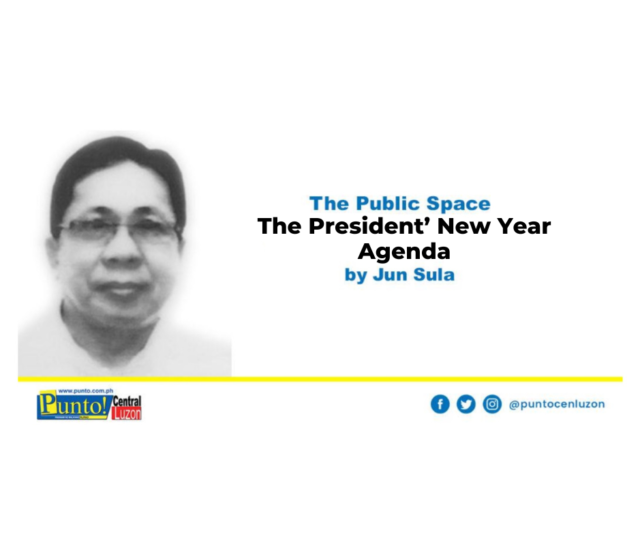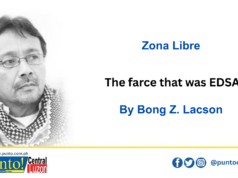Riding on a confidence-building and ego-boosting momentum in the first six months of his administration in 2022, President Bongbong Marcos (PBBM is set to approach 2023 on a stronger, more challenging footing. He is reported to be visiting Beijing early next year to meet China’s powerful leader, Xi Ping. Obviously, the West Philippine Sea will be first and foremost in the agenda.
So much is at stake. Or to be more exact, there’s more than meets the eye, like the popular galunggong hauled by Chinese fishermen from the WPS and sold back to the Philippine markets at high price. Two things are compelling in light of the planned visit : one is macro, the other micro.
On the one hand, PBBM cannot be less than a global leader in tackling this issue with the Chinese leader with an expansive view, even a perceived heavenly mandate, of his own leadership in the world. On the other, neither can he be less than a nationalist statesman who must fully grasp the broader risks and rewards of pursuing such an issue with a modern hegemon who has apparently made up his mind. The global interest as well as the parochial one are intertwined, for existential or ideological reason.
His China visit reportedly this January will not have come at more volatile time. China continues its intimidating, if not provocative, moves vis-à-vis Taiwan even as the United States remains firm and unequivocal in its support for the latter’s defense. Other Asian countries like Japan have expressed concern about China’s aggressiveness, or bullying in the region.
PBBM’s impending one-on-one with Xi Ping had been preceded by his brief meeting with United States’ President Joe Biden who has since reaffirmed the Americans’ iron-clad commitment to the Philippines defense. Buoyed up by Biden’s reassurance, PBBM was quoted as saying he could not see the future without the US as a loyal ally, or words to that effect. Beijing must have heard the message loud and clear.
That said, obviously `there are relevant events in the background as well , like the Ukraine war and the increasing boldness of Chinese citizens in their protest against China’s anti-COVID policies. The world knows whose side China is on while the Philippines has declared its neutrality in the conflict by virtue of geographical distance, not ideological position. The US is leading the West in supporting Ukraine to thwart Russia’s aggression.
The implications cannot be ignored. Russia has predicated its invasion of Ukraine on the same pretext that China is making its unsettling, unnerving moves in the South China Sea and towarda Taiwan. The island has always been considered by China’s communist leaders a part of the mainland as much as the SCS or its parts belonging to it on the basis of its dubious nine-dash line theory. Russia’s aggression and Ukraine’s surprising success in repelling `it are new templates in the calculus of modern leaders like Xi Ping and Marcos, Jr. In fact, a big hole has been punched into the hype about rising hegemons in the world, particularly China. There is now a new caveat, a cautionary tale, a new dynamic to seriously consider..
“The race doesn’t belong always to the strong or to the swift”, King Solomon wrote, “ but things happened to all.” It’s an ancient biblical precept resonating in the 21st century strongly, largely driven by globalization and technology of which China is best example.
In the meantime, PBMM has to mind other importants things on his plate: rising inflation as a result of rising price of fuel and shortages of basic agricultural products like rice and sugar others, a huge debt, unbridled importation, gentrification and widespread land banking of fertile land for the same purpose, age-old corruption of the bureaucracy and poverty. Many priorities demand his full attention and decisiveness. Half a year or so,he has been been weighed and found wanting. Suffice it to say that a think tank has summed up his performance as a mix of excellent and poor decisions. “ It’s a trot, not a gallop”, U.S.-based Global Source reported.
On the positive side, the path for leadership in governance for PBBM is clearer and less encumbered. Political opposition is nearly non-existent. The problem on insurgency has weakened with the death of its founder. He has a tight grip on the legislative body, Congress. The judiciary appears showing a more flexible attitude toward the executive as it did during the rule of PBBM’s predecessor, Duterte.
Whether leading or governing, the flipside of PBBM’s leadership in governance is showing. The stigma of the past follows him , and he is motivated to erase it and restore the family’s reputation. The EDSA Revolution that made them a global pariah for good governance must be replaced. A new image, the legendary one must emerge as factual not fiction –, not an easy, if not impossible, task. The past is always tense, so wrote an intellectual. In other words, his leadership in governance betrays a deeper motivation to revise the past narrative about the Marcos family into the golden age legend that he has claimed.
Experts say that leadership must be imbued with inspiration and illumination, guiding and leading through example and charisma. There’s no doubt,PBBM has the latter. Example, however, must be established beyond question as well. Trust, critical to the repeated call for unity he invokes occasionally for a stronger and more progressive nation, remains suspect.
How he handles the WPS or SCS dispute with XI Ping has a transcendental value on the other things he wants to accomplish for the nation. “ History may maybe thought of as a river,” former US state secretary Henry Kissinger wrote in his book “World Order”, but its waters will be ever changing.”
PBBM’s forthcoming visit to China must be informed by the new dynamics and realities.





